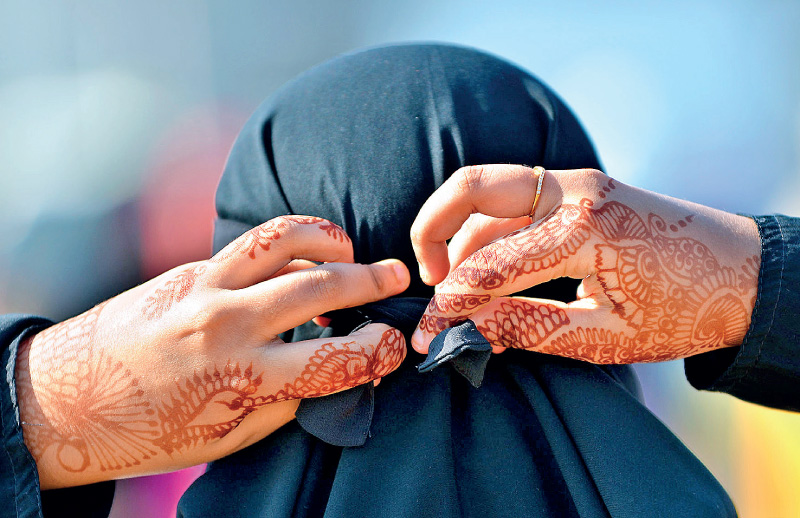Wednesday Feb 18, 2026
Wednesday Feb 18, 2026
Thursday, 9 September 2021 00:00 - - {{hitsCtrl.values.hits}}

Do the majority of the Muslim women want reforms to MMDA? The clear and unequivocal answer is that the larger Muslim community is not bothered at all – Pic by Shehan Gunasekara
 “We are governed, our minds are moulded, our tastes formed, our ideas suggested, largely by men we have never heard of,” wrote Edward L. Bernays in 1928, in his influential book ‘Propaganda’.
“We are governed, our minds are moulded, our tastes formed, our ideas suggested, largely by men we have never heard of,” wrote Edward L. Bernays in 1928, in his influential book ‘Propaganda’.
The purported reforms to the Muslim Marriage and Divorce Act (MMDA) are an exercise similar to the above quote. Specifically relating to the new recommendations namely to undermine the Quazi Court system and the abolition of polygamy. These came neither from a collective of respected personalities from the Muslim community nor from a collaboration of any reputed Muslim organisations. And, the jewel in the Crown is that none of the Government appointed Committees had ever made recommendations to that effect. It is being influenced by those whom the larger Muslim community have never heard of.
These practices form part of the unmistakable collective spirit and character of the Muslim community handed down from antiquity. They are so deeply embedded that they cannot be separated from the cultural ethos of the community. In other words, they constitute the ‘conscience’ referred to in Article 10 of the constitution.
The Supreme Court of India in S.P. Mittal Etc. vs Union Of India And Others said: “Any Freedom or Right involving the conscience must naturally receive a wide interpretation and the expression ‘religion’ and ‘religious denomination’ must therefore, be interpreted in no narrow, stifling sense but in a liberal, expansive way.” (1983 SCR (1) 729). Freedom of conscience is not to be separated from the Right to profess, practice and propagate religion. They go together and together they form part of the Right to Freedom of Religion.
They don’t care
The overall ignorance of the Muslim public and its ‘don’t care’ attitude on certain matters provide a conducive environment for agenda-driven interests. The larger segment of the Muslims who are poor are more worried of their next meal than fashionable ‘women’s rights’.
Do the majority of the Muslim women want reforms to MMDA? The clear and unequivocal answer is that the larger Muslim community is not bothered at all. This is the truth. Let us do a simple calculation and analysis using empirical evidence. The Muslim population in this country is approximately 9% which totals to approximately two million. Of the total population of Sri Lanka, those between the ages of 15-59 is around 12,707,000 as per 2012 Department of Census and Statistics. How much is 9% of this overall figure? It works out to 1.1 million Muslims.
Ask this 1.1 million Muslim people both men and women, the following questions:
1. Are you aware that MMDA requires serious reforms?
2. Are you demanding for the repeal of the MMDA?
3. Are you supporting the abolition of polygamy and the Quazi court system?
4. Are you protesting that you are being mistreated under the MMDA?
5. As a woman, do you shout asking for women’s rights?
The answer to all these questions from the 1.1 million will be a resounding “No”! Except for a few hundreds. This means, to begin with, the vast majority of Muslims are not disturbed about the MMDA and are not concerned with any of the questions above. Now ask these same people the following questions:
1. Do you know that Islam permits multiple marriages?
2. Do you know that Muslim marriage (Nikah) and divorce (Talaq) are matters related to religion?
3. Do you know that Muslim marital affairs are looked into by the Quazi court?
The answer to all of these will be an emphatic, “Yes”!
The arithmetic above clearly demarcates the boundaries of the discussion between the million and the very, very few that is absolutely insignificant relatively. It is reasonable for the readers to curiously question then, who are these people protesting and making a loud noise about the MMDA? To be fair it must be acknowledged that this is a democratic state and freedom of association and expression is a constitutional right. So, anyone has the right to make a noise. Therefore, let us leave aside the ‘few’ and focus on the core issues that really impacts on the vast majority of a million people.
Centuries-old Muslim laws
Bertram CJ in the Supreme Court observed, “The brief Code of Mohammadan law promulgated in this Colony in 1806 are certain portions of a very great system of jurisprudence. It … has to be read in the light of the general principle of that jurisprudence.” King v Miskin Umma (26 NLR 330).
The Supreme Court in the above case has unambiguously acknowledged that the Code of Mohammadan law was promulgated in this Colony in 1806 and that it has to be read in the light of the general principle of that jurisprudence. Two elements of relevance in this statement are that it gives evidence of the age of practice of Muslim law in Sri Lanka and the depth of Islamic jurisprudence.
The formal history of the Quazi court begins in 1926 when the British Government appointed distinguished Muslim personalities to a Select Committee Chaired by M.T. Akbar who was the Acting Attorney General. They recommended the establishment of the Quazi Court.
Current period
In the Report dated 20 December 2017, of the committee appointed to consider amendments to the Muslim Marriage And Divorce Act, its Chairman Justice Saleem Marsoof PC, former Judge of the Supreme Court states as follows: “Hon Rauf Hakeem, who was then the Minister of Justice, gave details of the progress made by the Committee in his address to Parliament on 9th March 2012. It is also noteworthy that the Hon. Minister of Justice on that occasion was speaking in support of a resolution moved by Hon. A.H.M. Azver seeking the enhancement of the status of the Quazi Court System and with better facilities, which was duly adopted by Parliament.”
The above report citing the ‘Parliamentary Debates (Hansard) dated 9th May 2012’ highlights the resolution adopted by Parliament to the following effect: “This Parliament is of the opinion that the Quazi Court System that was established in Sri Lanka under the Muslim Marriage and Divorce Ordinance of 1929 and subsequently amended under the Muslim Marriage and Divorce Act in 1951 must be upgraded with powers vested with the Quazi judges to adjudicate upon all matters concerned with disputes arising in Muslim families and also the status of the Quazi Court System must be upgraded in such a manner where sittings be held in premises congenial to the dignity of the system and as the Quazi judges are appointed by the Judicial Service Commission they should be placed on a respectable and an acceptable salary structure payable to other judicial officers.”
Hyperbolic or Hypocritical
It is tragic that without focusing on what really needs to be done, energy is being directed towards trying to abolish or undermine the Quazi Court system. The natural conclusion that the community can arrive at is that this has more to do with everything other than sincere reforms to the MMDA.
Condemning the Quazi system based on delays and abuse is not a convincing argument. Such allegations only depict the extent to which one labours to make a mountain out of a molehill. Or, like someone remarked this is an act of deception to mislead the public because even in the regular courts these problems do occur.
No police training – Scotland Yard
Corruption and abuse are rampant almost everywhere in this country. Scotland Yard stopped training police, was a recent news item. Police Scotland has put a controversial scheme to train officers in troubled Sri Lanka on hold amid criticism from global watchdogs. The global watchdog has reported a surge in police abuses in Sri Lanka during the pandemic, including extrajudicial killings, torture and arbitrary detention. (The Times, 13.08.2021). Is the Police Ordinance going to be scrapped because of the abusive practices of a few policemen?
Provide the resources and facilities to ensure that the Quazi system functions efficiently. Revisit the appointment procedures and enhance the system to enable qualitative and efficient results.
It has been argued that if MMDA deprives ‘rights’ so do parts of the General Marriage Registration Ordinance (GMRO) and other personal laws. If Quazis are allegedly called abusive; so, can someone allegedly call some of the judges as the same. After all, why is it clearly laid down in the Constitution as follows with regard to the judges?
“The Judicial Service Commission is hereby vested with the Power to – (a) transfer judges of the High Court; (b) appoint, promote, transfer, exercise disciplinary control and dismiss judicial officers and scheduled public officers.” (Article 111H. (1)).
Why should the Constitution provide for the disciplinary control and dismissal of judicial officers? Judicial officers are not angels. In the same vein Quazis are not angels either. They are fallible. Like you and me, they are also human beings and are subjected to human weaknesses. Therefore, to only blame the Quazis and the Quazi system is irrational, illogical, indefensible and untenable if one is sincerely and truly interested in justice and reforms.
Therefore, I humbly urge everyone involved in this reform effort to please think independently, fairly and to act reasonably.
“Act well your part, there all the honour lies.” (Alexander Pope).
(The writer can be reached via email: [email protected].)